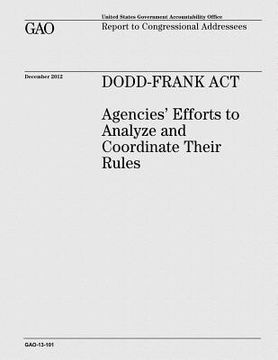Dodd-Frank Act: Agencies' Efforts to Analyze and Coordinate Their Rules (en Inglés)
Reseña del libro "Dodd-Frank Act: Agencies' Efforts to Analyze and Coordinate Their Rules (en Inglés)"
Federal agencies conducted the regulatory analyses required by various federal statutes for all 54 regulations issued pursuant to the Dodd-Frank Wall Street Reform and Consumer Protection Act (Dodd-Frank Act) that GAO reviewed. As part of their analyses, the agencies generally considered, but typically did not quantify or monetize, the benefits and costs of these rules. Most of the federal financial regulators, as independent regulatory agencies, are not subject to executive orders that require comprehensive benefit-cost analysis in accordance with guidance issued by the Office of Management and Budget (OMB). Although most financial regulators are not required to follow OMB's guidance, they told GAO that they attempt to follow it in principle or spirit. GAO's review of selected rules found that regulators did not consistently follow key elements of the OMB guidance in their regulatory analyses. For example, while some regulators identified the benefits and costs of their chosen regulatory approach in proposed rules, they did not evaluate their chosen approach compared to the benefits and costs of alternative approaches. GAO previously recommended that regulators more fully incorporate the OMB guidance into their rulemaking policies, and the Office of Comptroller of the Currency and the Securities and Exchange Commission have done so. By not more closely following OMB's guidance, other financial regulators continue to miss an opportunity to improve their analyses. Federal financial agencies continue to coordinate on rulemakings informally in order to reduce duplication and overlap in regulations and for other purposes, but interagency coordination does not necessarily eliminate the potential for differences in related rules. Agencies coordinated on 19 of the 54 substantive regulations that GAO reviewed. For most of the 19 regulations, the Dodd-Frank Act required the agencies to coordinate, but agencies also voluntarily coordinated with other U.S. and international regulators on some of their rulemakings. According to the regulators, most interagency coordination is informal and conducted at the staff level. GAO's review of selected rules shows that differences between related rules may remain even when coordination occurs. According to regulators, such differences may result from differences in their jurisdictions or the markets. Finally, the Financial Stability Oversight Council (FSOC) has not yet implemented GAO's previous recommendation to work with regulators to establish formal interagency coordination policies. Most Dodd-Frank Act regulations have not been finalized or in place for sufficient time for their full impacts to materialize. Recognizing these and other limitations, GAO took a multipronged approach to assess the impact of some of the act's provisions and rules, with an initial focus on the act's systemic risk goals. First, GAO developed indicators to monitor changes in certain characteristics of U.S. bank holding companies subject to enhanced prudential regulation under the Dodd-Frank Act (U.S. bank SIFIs). Although the indicators do not identify causal links between their changes and the act--and many other factors can affect SIFIs--some indicators suggest that since 2010 U.S. bank SIFIs, on average, have decreased their leverage and enhanced their liquidity. Second, empirical results of GAO's regression analysis suggest that, to date, the act may have had little effect on U.S. bank SIFIs' funding costs but may have helped improve their safety and soundness. GAO plans to update its analyses in future reports, including adding indicators for other Dodd-Frank Act provisions and regulations.

